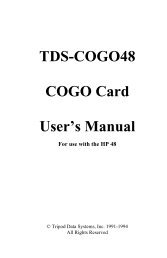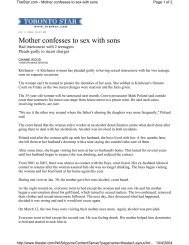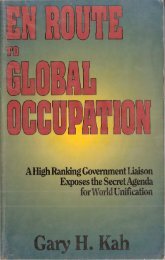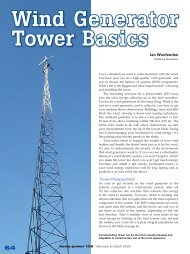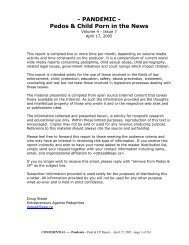G. Edward Griffin - The Fearful Master - PDF Archive
G. Edward Griffin - The Fearful Master - PDF Archive
G. Edward Griffin - The Fearful Master - PDF Archive
Create successful ePaper yourself
Turn your PDF publications into a flip-book with our unique Google optimized e-Paper software.
principle, a public statement of general good intentions. It has no other meaning. <strong>The</strong><br />
covenants, on the other hand, correspond to legislation and would, if ratified by the<br />
member nations, become legally binding upon us. <strong>The</strong>y would completely override and<br />
replace our own Bill of Rights. It is not surprising, therefore, to discover that there is often<br />
quite a substantial difference between the wording of the Declaration of Human Rights<br />
and the draft covenants on human rights. <strong>The</strong> sweet-sounding, vague terminology of the<br />
declaration has been replaced by far more precise and enforceable language in the<br />
covenants. But in the case of the right to own property, the provision which appeared in<br />
the declaration, vanished altogether in the covenant!<br />
Dr. Charles Malik of Lebanon was the chairman of the United Nations Human Rights<br />
Commission. Writing in the United Nations Bulletin of September 1, 1952, be said:<br />
I think a study of our proceedings will reveal the amendments we<br />
adopted to the old text under examination, responded, for the most part,<br />
more to Soviet than to western promptings. . . . <strong>The</strong> concept of property<br />
and its ownership is at the heart of the ideological conflict of the present<br />
day. It was not only the Communist representatives who riddled this<br />
concept with questions and doubts; a goodly portion of the non-<br />
Communist world had itself succumbed to these doubts. A study of this<br />
particular debate will reveal the extent to which the non-Communist<br />
world has been communistically softened or frightened.<br />
He further stated that a "quiet revolution" had occurred with the emphasis shifting "with a<br />
vengeance" from personal liberty to "the adequate standard of living."<br />
It was nine years later, after this trend had gone even further, that United States<br />
Ambassador Adlai Stevenson said:<br />
<strong>The</strong> United Nations-- as an idea and as an institution-- is an extension<br />
of western ideas; of western belief in the worth and dignity of the<br />
individual; of western ideology. It is based on a western parliamentary<br />
tradition. Its roots are in the western ideal of representative government.<br />
When one stops to consider the philosophical foundation of the UN, it is<br />
easier to understand why Premier Khrushchev pounds the desk in<br />
frustration. 4<br />
That sound you just heard was George Washington and Thomas Jefferson turning over in<br />
their graves.<br />
In 1948 the United Nations subcommittee on information and of the press issued a<br />
proposed international convention supposedly to protect the right "to seek, receive and<br />
impart" information by word of mouth and by publication. It then proceeded to state that<br />
government has the- right to impose "penalties, liabilities and restrictions" as well as the<br />
"right of correction" whenever it felt that news had been reported falsely. 5 More recently<br />
the Preamble of the United Nations Convention on Freedom of Information was altered to<br />
contain this significant qualification: ". . . freedom of information and opinion accurate,<br />
objective and comprehensive." 6 [Italics added.]<br />
An excellent example of the kind of freedom of information the world could expect under<br />
future United Nations management was provided at a meeting of "psychiatrists and<br />
scientific authorities" held under the auspices of the UN World Health Organization (WHO)


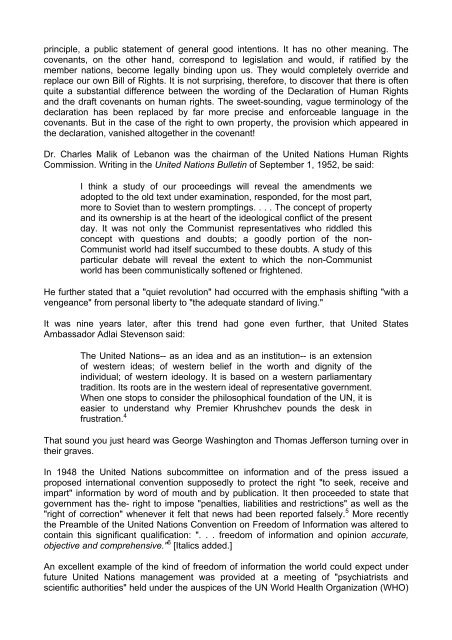
![Robert T McQuaid [rtmq@stn.net] Sent: Friday, October 29, 2004 12 ...](https://img.yumpu.com/51070071/1/190x245/robert-t-mcquaid-rtmqstnnet-sent-friday-october-29-2004-12-.jpg?quality=85)

